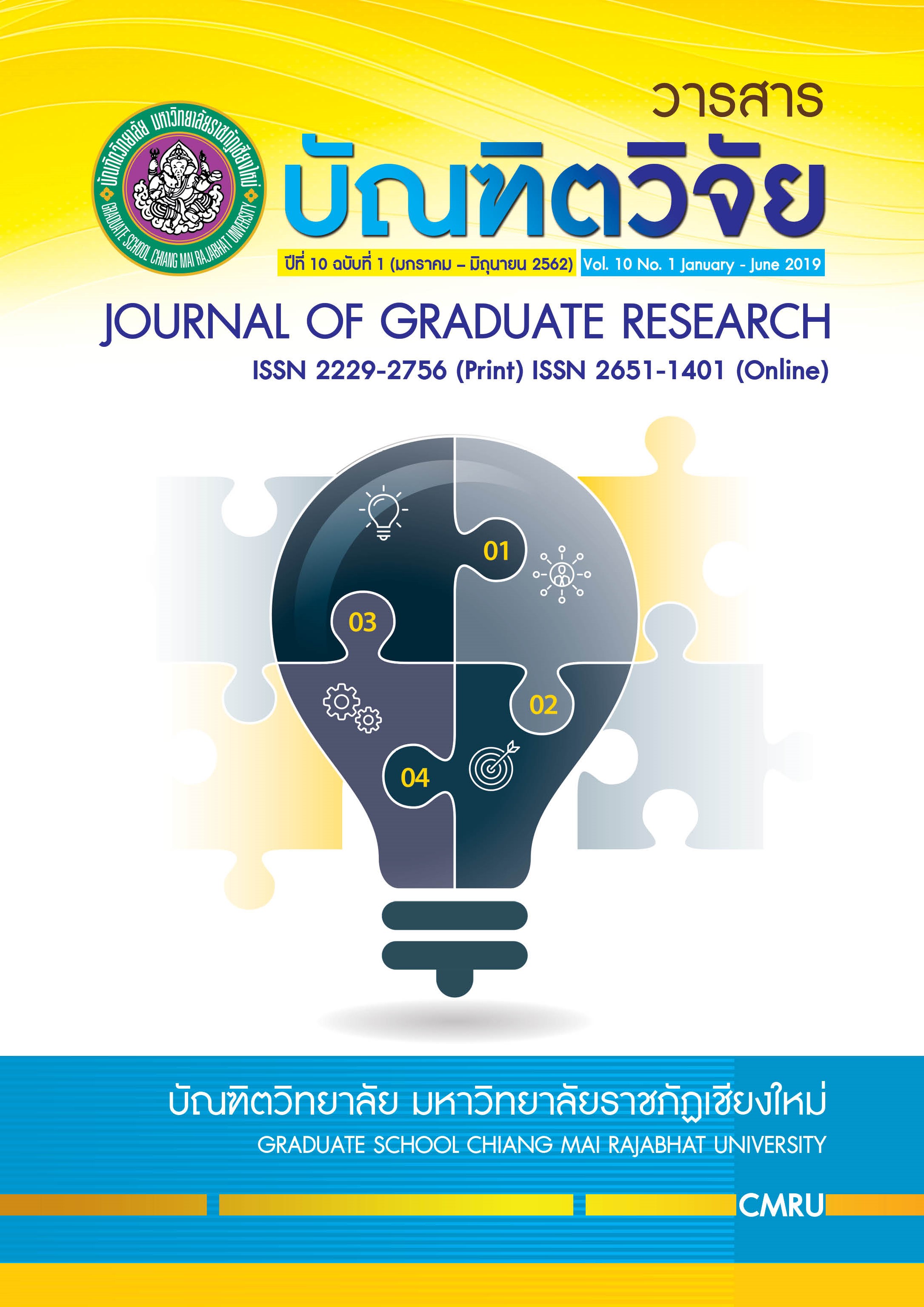Factors Affecting Intention to Quit of Generation Y Staff in Autopart Manufacturers in Laemchabang Industrail Estate
Main Article Content
Abstract
The objectives of this research were 1) to study the factors affecting in intention to quit of generation Y staff in autopart manufacturers were, Laem Chabang industrial estate, 2) to compare their intention to quit by personal factors, and 3) to examine the influence of the factors over their intention to quit. The sample group of this study was 334 generation Y employees and the questionnaire was use to collect the data. The data were statistically analyzed for percentage, mean, standard deviation, T-test, variance analysis (one-way ANOVA), comparing differences in pairs by LSD and multiple regression analysis. The results of this research showed that 1) the opinions of the generation Y employees on internal management was at a high level ( = 4.10). 2) The generation Y employees had different levels of intention to quit in accordance with personal factors. Their income and marital status statistically affected their intention to quit at the 0.05 level. 3) The factors influencing their intention to quit were working environment (β = 0.26) and job satisfaction (β = 0.24). They were found to have the influence over their intention at the significance level of 0.05.
Article Details
References
ธวัชชัย บุญเพิ่มราศี. (2552). ความสัมพันธ์ระหว่างบุคคลที่มีผลต่อการตั้งใจลาออกจากงานของบุคลากรมหาวิทยาลัยธุรกิจบัณฑิตย์. (สารนิพนธ์ปริญญามหาบัณฑิต, สาขาวิชาจิตวิทยาอุตสาหกรรมและองค์การ คณะศิลปศาสตร์, มหาวิทยาลัยเทคโนโลยีพระจอมเกล้าพระนครเหนือ).
ปรีญานุช สมนึก และ ลัดดาวัลย์ สำราญ. (2559). ปัจจัยที่มีอิทธิพลต่อการลาออกของพนักงานในธุรกิจถ่านหินเขต ภาคกลาง. วารสารบัณฑิตศึกษา, มหาวิทยาลัยเทคโนโลยีราชมงคลสุวรรณภูมิ, 1(1), 54-64.
พงษ์จันทร์ ภูษาพาณิชย์. (2553). คุณลักษณะของบุคคล การรับรู้การสนับสนุนจากองค์การ การรับรู้ความสามารถของตนด้านอาชีพ ความพึงพอใจในงาน กับความตั้งใจลาออกจากงานของพนักงานมหาวิทยาลัยเชียงใหม่. (รายงานวิจัย, สาขาจิตวิทยา คณะมนุษศาสตร์ มหาวิทยาลัยเชียงใหม่).
ภราดี บุตรศักดิ์ศรี. (2540). ความสัมพันธ์ระหว่างปัจจัยส่วนบุคคล ความพึงพอใจในงานและแนวโน้มที่จะลาออกจากองค์การของพนักงานในกลุ่มธุรกิจบริษัทเงินทุนในเขตกรุงเทพมหานคร. (วิทยานิพนธ์ศิลปศาสตรมหาบัณฑิต, สาขาจิตวิทยาอุตสาหกรรมและองค์การ คณะศิลปศาสตร์, มหาวิทยาลัยธรรมศาสตร์).
วิโรจน์ สิมะทองธรรม. (2559). ปัจจัยที่มีอิทธิพลต่อความตั้งใจที่จะลาออกจากงานของพนักงานกลุ่มคนรุ่นใหม่ของธนาคารพาณิชย์ไทย. วารสารวิทยาการจัดการสมัยใหม่, 9(2). 1-12.
วรรณวิสา ดำรงสกุลวงษ์. (2557). ปัจจัยที่มีอิทธิพลต่อแนวโน้มการลาออกของพนักงานในอุตสาหกรรมฟอกหนัง กรณีศึกษา บริษัท อินเตอรไฮค์จํากัด (มหาชน). (การค้นคว้าอิสระบริหารธุรกิจมหาบัณฑิต, บัณฑิตวิทยาลัย มหาวิทยาลัยเนชั่น).
วรรณา ยงพิศาลภพ. (2559). รายงานภาวะอุตสาหกรรมรายไตรมาส อุตสาหกรรมรถยนต์. (ปี 2559-2561).
ชลภัสสรณ์ ศรีวรฉัตรภาธร. (2558). ปัจจัยที่ส่งผลต่อความตั้งใจลาออกจากงานของพนักงานแผนกห่วงโซ่อุปทาน :กรณีศึกษาบริษัทผู้ผลิตสินค้าอุปโภคบริโภคแห่งหนึ่งในเขตกรุงเทพมหานคร. Veridian E-Journal, Slipakorn University, 8(1). 185-200.
อิสริยาภรณ์ วรรณะและสุจิตรา จันทนา. (2557). สภาพการจ้างที่มีความสัมพันธ์กับการออกจากงานของพนักงานในนิคมอุตสาหกรรม จังหวัดพระนครศรีอยุธยา. (วิทยานิพนธ์บริหารธุรกิจมหาบัณฑิต, มหาวิทยาลัยนานาชาติเซนเทเรซา).
Cho, S., Johanson, M. M. & Guchait, P. (2009). Employees intent to leave: A comparison of determinants of intent to leave versus intent to stay. International Journal of Hospitality Management, 28,374-381.
Farris, G. F. (1971). A predictive study of turnover. Personnel Psychology, 24, 311-328.
Marxen, D. E. (1996). The big 6 experience; A retrospective account by alumni. Accounting Horizons, (june), 73-78.
Nadiri, H. & Tanova, C. (2010). An investigation of the role of justice in turnover intentions, job satisfaction, and organization citizenship behavior in hospitality industry. International Journal of Hospitality Management, 29(1), 33-41.
Taro, Y. (1973). Statistics: An introductory analysis. (3rd ed). New York: Harper and Row Publication.
Wanous. (1979). The pay level affects the adjustment of new entrants. Journal of vocational behavior, 17(3), 263-290.

